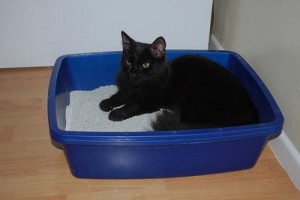 A crucial part of being the proud owner of a cat is having a litter box that your cat ALWAYS uses! Not only can the smell of cat’s urine clear a room, there are also dangers associated with breathing the ammonia. Strong ammonia from cat urine can be dangerous if it is in high enough concentration. You can experience a loss of sense of smell, increased heart rate, irritation to the eyes and mucous membranes, lung irritation and coughing, and nausea.
A crucial part of being the proud owner of a cat is having a litter box that your cat ALWAYS uses! Not only can the smell of cat’s urine clear a room, there are also dangers associated with breathing the ammonia. Strong ammonia from cat urine can be dangerous if it is in high enough concentration. You can experience a loss of sense of smell, increased heart rate, irritation to the eyes and mucous membranes, lung irritation and coughing, and nausea.
Safe to say it’s important to make sure your cat loves his litter box. Not to worry, there are a few things you can do ensure you don’t have any accidents to deal with (or furniture to replace).
The first step in preventing litter box problems is to choose the right litter box. While a covered litter box may be more appealing to you, it could actually hurt your cause. Not all cats prefer the same type of litter box, so your best bet is to try a few and see what your cat prefers.
Choosing the best type litter for your cat is step number two. Believe it or not, the way the litter feels and smells plays a role in how much your cat likes his litter box.
The location of the litter box will determine whether your cat will actually use it. Here are a few tips from the Humane Society of the U.S.:
- Keep the litter box in a spot that gives your cat some privacy yet is also conveniently located. If the box is too hard to get to, especially for a kitten or an elderly cat, he just may not use it.
- Avoid placing litter boxes next to noisy or heat-radiating appliances, like the furnace or the washing machine. The noise can make a cat nervous, while the warmth of a dryer or furnace can magnify the litter box smell, which could make him stay away from it.
- Put the box far away from his food and water bowls. Cats don’t like that smell too near their food and may not use the box.
- Place at least one litter box on each level of your house. That way your cat has options if access to his primary box is blocked (the basement door is closed or your dinner party has him holed up in the bedroom.) If you have more than one cat, provide litter boxes in several locations so that one cat can’t ambush another cat using the litter box.
- If you keep the litter box in a closet or a bathroom, be sure the door is wedged open from both sides to prevent your cat from being trapped inside or locked out. Depending on the location, you might consider cutting a hole in a closet door and adding a pet door.
If you have more than one cat, you’ll want to have a litter box for each one. If it’s not possible to have multiple litter boxes, keep the one you do have extremely clean.






[…] Keep Your Cat Loving its Litter Box A crucial part of being the proud owner of a cat is having a litter box that your cat ALWAYS uses! Not only can the smell of cat's urine clear a room, there are also dangers associated with breathing the ammonia. Strong ammonia from cat urine can be … Read more on All Pet News (blog) […]
Comments are closed.